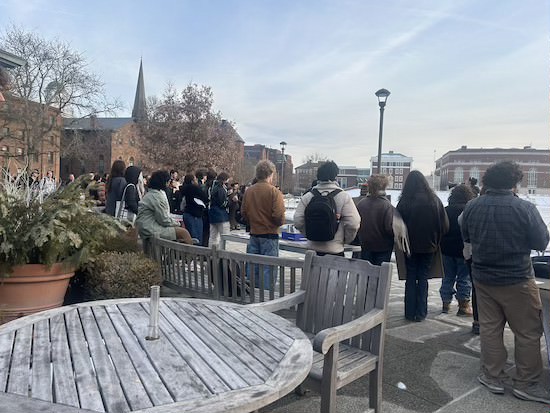
c/o Anabel Goode
At 4:30 p.m. on Monday, Feb. 24, approximately 50 students and faculty members gathered outside Usdan for a rally hosted by individuals associated with Wesleyan Young Socialists, CT Palestine Solidarity Coalition, Beyond Empire, Students for Justice in Palestine, Wesleyan Refugee Project, CT Labor for Palestine, and CT Students for Palestine.
Flyers informing students of the protest details were widely disseminated across the University as organizers in buildings around campus handed them out to students and slipped papers under doors in residence halls.
“The regional planning for this coordinated effort has been underway since mid-December, directed by the February Action Committee, an ad hoc committee created by CT Students for Palestine,” June Labourdette ’25 wrote in a letter to the editor on Feb. 18.
Amidst an email campaign that sent over 2000 emails to administrators at the University calling for increased oversight and potential University intervention in the rally, the rally’s organizers emphasized their efforts to ensure the rally was legal and within the University’s code of conduct.
“The Committee for the 2/24 Protest has built this action safely and legally so that everyone is able to attend, keeping in mind vulnerable communities like the immigrant population and the international student population who face the most extreme forms of oppression for exercising their right to free speech,” one of the main organizers of the rally, who goes by Rosa ’25, wrote in a message to The Argus.
The protest began with multilingual calls for Palestinian liberation and was followed by several speeches interspersed with chants. Speakers included Assistant Professor of Anthropology George Bajalia, Erwin Freed of CT Labor for Palestine, and Katal Center for Equity, Health, and Justice Program Manager Diana Martinez.
The speakers discussed a variety of domestic and international issues, ranging from United States aid to Israel to local wages and housing costs. Rosa emphasized that the main purpose of the rally was not to drive policy change but rather to expand the involved groups’ networks on campus.
“We had the protest [on campus] because we are protesting to build a unified student body for Palestine,” Rosa wrote. “We don’t imagine that the administration or any of the appendages of U.S. imperialism are going to change their mind because of lobbying. We change the world by winning over the people, by protesting in the streets, and by building solidarity between our movements.”
Their point was underscored by the presence of outside groups who attended the event. The Ukraine Solidarity Network had a table at the event and passed out flyers that linked the Russian invasion and occupation of Ukraine to the war between Israel and Hamas.
“Both Ukraine and Palestine are facing wars waged on them by powers that seek not only to subjugate them militarily but to erase them as a people with their own national identity,” the Ukraine Solidarity Network wrote in a letter handed out to protestors.
Students in attendance also argued that the intersectionality of Monday’s protest was essential to their movement.
“It’s a time to protest right now, considering the variety of things that are happening in the world,” Miles Horner ’26 said. “While Palestine is the name of this protest, all oppression is interconnected.”
As the rally began, a group of about 10 counter-protesters gathered on the Usdan balcony. They were not affiliated with a specific group, but rather mobilized through group chats after seeing posters for the rally. The counter-protesters waved Israeli flags and sang in Hebrew, holding posters with pictures of hostages taken captive by Hamas militants on Oct. 7, 2023.
“Free Gaza from Hamas,” read one of their posters.
Zachary Rosen ’27, who was present at the rally in support of the counter-protesters, emphasized that he did not want his or the group’s presence to increase division.
“Antisemitism has been on the rise globally,” Rosen said. “We’re here because there are a lot of arguments and perspectives on the Middle East, and it’s important to have conversations. We want to present our perspective, and we want to talk to people.”
The rally lasted about 70 minutes and was entirely peaceful. Two Public Safety officers were present but did not intervene.
Anabel Goode and Miles Craven contributed reporting.
Miles Pinsof-Berlowitz can be reached at mpinsofberlo@wesleyan.edu.